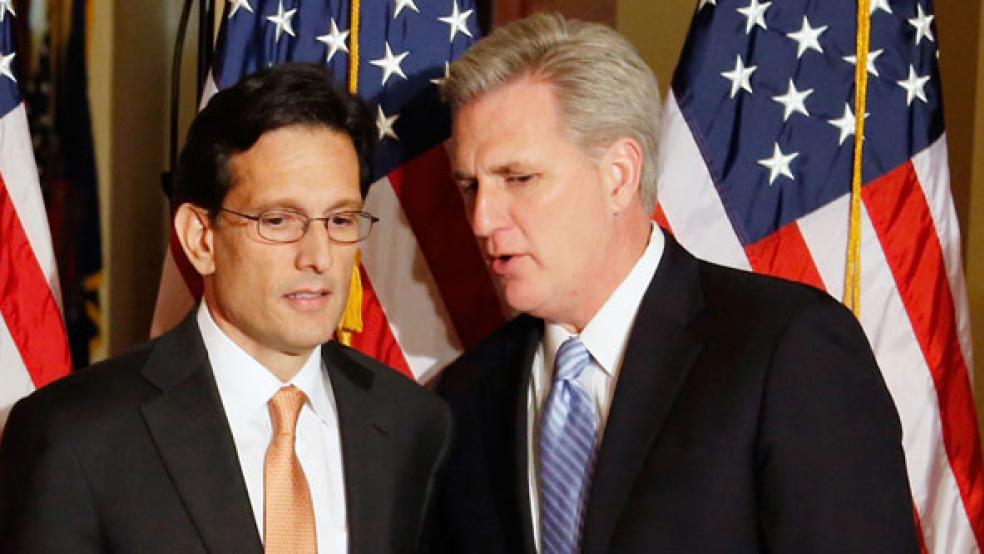The defeat of House Majority Leader Eric Cantor (Va.) in a Republican primary was an astounding triumph for the tea party movement, but there was little evidence Thursday that the insurgency could take advantage of it by getting one of their own elected to the suddenly vacant leadership position.
In the race to replace Cantor, who will step down from his leadership post at the end of July, House Republicans began coalescing around Majority Whip Kevin McCarthy (Calif.), who is more aligned with the establishment wing of the party.
Related: Cantor's Endorsement of McCarthy - Blessing or Curse?
The leadership battle began to crystallize Thursday morning as a popular conservative, Rep. Jeb Hensarling (Tex.), who chairs the House Financial Services Committee, announced that he wouldn’t run for majority leader and Pete Sessions (R-Tex.) entered the race and then withdrew within hours.
McCarthy spent Tuesday night consoling Cantor and other stunned colleagues after the leader’s unexpected loss. Restless on Wednesday morning, McCarthy skipped breakfast and began working on his campaign in his office about 7 a.m., said aides who are familiar with his plans but not authorized to speak publicly.
McCarthy is relying on a tight-knit inner circle of colleagues to secure support, a group including Reps. Richard Hudson (N.C.), Fred Upton (Mich.), Dave Camp (Mich.) and Harold Rogers (Ky.) — influential names in the House GOP conference.
Related: 5 Urgent Questions Following Cantor's Loss
The team is using a ranking system once employed by then-House Majority Leader Tom DeLay (R-Tex.) that McCarthy still thinks is a smart way to track friends and foes. His 232 colleagues in the House GOP conference are given a ranking between one and five. A one means the colleague is a loyalist, while a five denotes a critic or someone who needs more convincing, aides said. Rankings for individual members are a closely guarded secret.
Sessions spent Thursday morning at a meeting of Republican lawmakers from the South, pitching himself as an experienced alternative to McCarthy, a longtime rival.
“The process got fast, but it’s a process. I’m out there talking to delegations,” he said in an interview. “I’m giving people a real view of how I’d lead. I’ve chaired the Rules Committee and the [National Republican Congressional Committee], and I’m looking to bring people in, sell our message and lead.”
But on the House floor later Thursday afternoon, Sessions wandered through the aisles, finding it hard to gain votes as McCarthy’s aides worked members as well. Sessions went up to popular conservative figures, such as Rep. Trey Gowdy (S.C.), hoping to find support, but was not met with extensive encouragement. Sessions announced his withdrawal Thursday evening.
Related: How Growing Partisanship Is Splitting U.S. in Two
Meanwhile, McCarthy appeared to be consolidating support. House Budget Committee Chairman Paul Ryan (Wis.), the GOP’s 2012 vice presidential nominee, said he will support McCarthy. And Rep. Adam Kinzinger (Ill.), a McCarthy ally, said he thinks the Californian has secured the votes. “At the end of the day, I think McCarthy has got this one over the top,” he said.
One holdout was conservative Rep. Tom Price (Ga.), who declined Thursday to say whom he plans to endorse, reflecting some tension within the GOP. “It’s a secret ballot,” he repeated when pressed on his preference for leader. Price, who has long pushed for more conservatives in the leadership and once ran for the conference’s fourth-ranking position, also declined to comment on McCarthy’s ideology.
Working on the premise that McCarthy will become leader, several members appeared to be in play for his whip job.
Rep. Peter Roskam (Ill.), McCarthy’s chief deputy whip, has told colleagues that his experience makes him a natural choice. But Rep. Steve Scalise (La.), chairman of the Republican Study Committee, is arguing that with McCarthy and House Speaker John A. Boehner (Ohio) at the top, he can be a voice for the House’s conservative Southerners and tea party lawmakers.
Scalise held a conference call late Wednesday with GOP members, touting the support of more than 25 colleagues across the conference, including Rep. Aaron Schock (Ill.) — a signal that Roskam cannot count on the entire Illinois delegation.
Roskam, meanwhile, worked the floor Thursday afternoon, consulting with Reps. Tom Graves (Ga.) and Lamar Smith (Tex.), two popular conservatives. Others with an eye on the whip job include Rep. Marlin Stutzman (Ind.) and, potentially, Sessions, if he does not gain traction for leader.
Adding to the drama surrounding the week’s unexpected events, two former GOP House speakers made rare appearances in the Capitol this week.
Newt Gingrich (Ga.) visited Thursday and said that McCarthy’s expected and seemingly easy rise to majority leader is a testament to the power of having an extensive political operation already in place — and McCarthy’s affable personality. “Unless you’ve been out there organizing for a long time, it’s hard to beat somebody who has been counting votes for years and knows the entire conference,” Gingrich said. “Legislative bodies reward friendliness.”
Late Wednesday night, former speaker J. Dennis Hastert (R-Ill.) was spotted guiding a family around the Capitol, telling stories about famous House members. “Eric had a lot of promise and some people pinned their hopes to him,” Hastert said as he paused outside of the office he once occupied. “But things change in this business. One day you’re at the top and the next you’re saying goodbye to your staff.”
Wesley Lowery contributed to this report, which originally appeared in The Washington Post.
Read more in The Washington Post:
Bergdahl's Writings Reveal a Fragile Young Man
Dana Milbank: Eric Cantor's Instant Burial
Iraq Disintegrating As Insurgents Head Toward Baghdad




